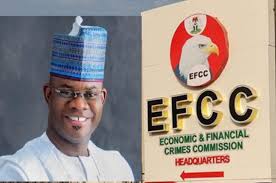The Economic and Financial Crimes Commission in a statement on Wednesday by its spokesman, Oyewale, the EFCC warned Nigerians against obstructing its operatives during their duties.
“The EFCC wishes to warn members of the public that it is a criminal offence to obstruct officers of the commission from carrying out their lawful duties.
“This warning becomes necessary against the background of the increasing tendency by persons and groups under investigation by the commission to take the laws into their hands by recruiting thugs to obstruct lawful operations of the EFCC,” Oyewale said.
It happened that Kogi State Governor, Usman Ododo, on Wedneday, foiled an attempt by the Economic and Financial Crimes Commission to arrest the immediate-past governor of the state, Yahaya Bello, at his 9, Benghazi Street, Wuse Zone 4, Abuja residence.
The operatives of the anti-graft agency had stormed the street around 9.30 a.m. on Wednesday and laid siege to the former governor’s residence, preventing both human and vehicular movements.
The EFCC operatives were, however, resisted by armed policemen dressed in black, with the inscription ‘Special Forces.
Our correspondent, who visited the residence on Wednesday afternoon, observed the heavy presence of armed operatives of the EFCC, policemen, operatives of the Department of State Services, Counter Terrorism Unit and Yahaya Bello’s private security team.
The stalemate continued as the EFCC operatives were prevented by the policemen and other armed men guarding the former governor from entering the house.
At exactly 2.30 p.m., the convoy of the Kogi State governor, Ododo, arrived at the residence, alongside several security operatives and youth supporters.
Governor Ododo was ushered into the residence by his security details and around 4:20 p.m., the convoy left the residence with Bello inside the governor’s car.
About 10 minutes after the governor and the former governor had left, the EFCC operatives laying siege to the residence were seen retreating to Benghazi Street, Wuse Zone 4, Abuja, while the DSS operatives and other security agents guarding the house also drove off shortly after.
Confirming the development to our correspondent, a source who preferred anonymity because of the sensitive nature of the case, said, “The former governor has left. He left with Governor Ododo, who just drove out now with his security guards.”
A source at the EFCC, who also preferred anonymity, said, “Yahaya Bello has escaped with the Kogi State Governor, Ododo. Our operatives could not stop the governor.”
Efforts to confirm the reason behind the siege on Bello’s residence failed as the spokesperson for the EFCC, Dele Oyewale, did not respond to inquiries concerning the development.
The EFCC had been having a running battle with the former governor over allegation of corruption.
The anti-graft agency had arraigned the ex-governor’s nephew, Ali Bello, in a charge that featured the ex-governor’s name.
The EFCC, in the charges, alleged N84bn fraud.
Bello, on his part, described the seige on his home by the EFCC as an illegality, calling on President Bola Tinubu to rein in the anti-graft agency.
In a statement released by his media office, Bello said the move by the EFCC to arrest in was in violation of a February 9, 2024 of a Kogi State High Court in Lokoja, which restrained the EFCC from “harassing, arresting, detaining, or prosecuting” him pending the determination of the fundamental rights suit filed by the ex-governor against the EFCC.
The media team said: “It is a surprise that an agency led by a lawyer could flagrantly disobey a subsisting court order, by taking actions contrary to the reliefs granted.
“We are aware of the total commitment of President Bola Tinubu’s current administration to the rule of law and can say categorically that the EFCC leadership might have offered the agency on a silver platter to desperate politicians to convert it to their score-settling tool, without minding the effect on its integrity and the image of Nigeria as regards the rule of law.”
END.

